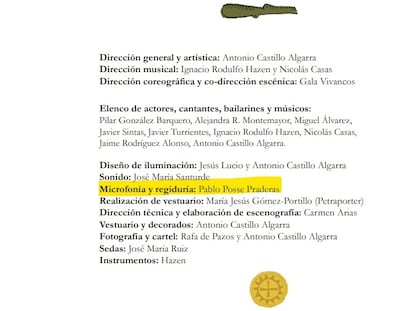Antonio Castillo Algarra is a playwright, actor, translator, exam teacher… and now also the man in the shadows who manages all the threads of Madrid education, from nurseries to public universities. Without being part of the staff, he has filled the controversial law on higher education (Lesuc) that Isabel Díaz Ayuso intends to approve with ideological prejudices, as well as adding and removing positions at will. “He is Ayuso’s Rasputín. On a par with Miguel Ángel Rodríguez,” five sources agree.
But Castillo Algarra in this case acts in anonymity, even if the mark is indelible and can be traced through For the fun of it, a theater company and an opponents’ training academy of which he is the sole owner. This newspaper has evidence that four senior officials linked to the Ministry of Education were part of the undertaking: the general directors of the University (Nicolás Casas) and Secondary and FP (María Luz Rodríguez Lera) and the regional secretaries of the PP of Education (Pablo Posse) and Family (Mónica Lavin), who are themselves regional deputies. In consultancy they are known as “the pocholos”. His inexperience in management is popular voice.
According to two of the sources consulted, the councilor Emilio Viciana was a professor at the Academy. The general director of Artistic Education, former dancer Miguel Lumbreras, is also very close to Castillo Algarra, but there is no evidence that he was related to his company. The three are patrons of the Teatros del Canal, managed by the Community of Madrid. In one of its rooms, the playwright’s latest production based on The theater of the worldof Calderón de la Barca. The playwright is also one of the three people who now direct the Spanish Ballet of the Community of Madrid and is part of it together with Viciana.
The Ministry of Education did not respond to questions sent by EL PAÍS. He simply responds with a short paragraph that clarifies nothing about this mess of professional relationships. “The draft Law on Higher Education, University and Science (Lesuc) is being prepared by the regional government, in particular by the group of the Department of Education, Science and University led by Emilio Viciana. Antonio Castillo Algarra has no working relationship with the department.” This newspaper tried for three days to collect the playwright’s testimony via email, WhatsApp and finally via phone call. “I can’t talk, we’re in the middle of rehearsals and we’ll have the premiere soon,” he apologized very kindly yesterday.
Castillo Algarra does not maintain direct contact with the opposition, the unions, the rectors or the Ministry of Science, Innovation and University, but his power is too great to go unnoticed. “After six years (Ayuso was appointed president in 2019), she believes she is invisible,” says a source. Only one photo on his Instagram immortalises their friendship. In the image, from December 2019, he holds the president by the waist and at the bottom he writes: “With Isa, we celebrate the Constitution”. Four months earlier, he had shared on social networks a controversial article by the playwright, in which he called homosexuals “monstrous” and “not normal”, while negotiating his investiture with Vox and Ciudadanos. Then he deleted the tweet after it set the networks on fire, but the press had already echoed it. There is no longer any public record of their close friendship.
Article that I recommend reading 100%.
Ideological degeneration makes it possible for those who once rejected homosexuals to now turn them into human shields, even weapons. https://t.co/LJdN9NyUXu
— Isabel Díaz Ayuso (@IdiazAyuso) July 24, 2019
Two inexperienced CEOs
The musicologist Nicolás Casas, director general of the universities, remains linked to the Castillo Algarra theater company. He performs in Calderón’s auto sacramental playing the sackbuche, the predecessor of the modern trombone, and is one of the musical directors. He had previously participated in three other productions of For the fun of it.
The managerial experience of Casas, a graduate in Art History and a doctor, was almost non-existent when he accepted the job and Madrid is a transatlantic with 206,501 students enrolled last year in public universities. Previously, he was a researcher at the musicology department of the Complutense for four years, seven months as a technician at the Madr+id Knowledge Foundation, dependent on the Community, and another 15 months at the University of Comillas.
Casas took office on July 5, 2023, when Viciana was appointed councilor. María Luz Rodríguez de Lera also took office that day. “In recent years she has been a teacher of History and Spanish Language and Literature at ESO and Baccalaureate at a charter school,” explains the CAM Transparency Portal about the Director General of Secondary Education, Vocational Training and the Special Regime. And about his previous career he adds: “He managed the administration of an unregulated education academy, publishing house and theater producer.” The name doesn’t appear, but it’s for the fun of it. His power is very great. More than 600,000 schoolchildren signed up for these training courses in Madrid last year.
Pablo Posse, spokesperson for Education in the Madrid Assembly, emerges in the assembly’s program Don Juan from Don Juan (2022) in the “microphony and management” section. Now he acts as a “benefactor” and is thanked in the closing credits of another work. Posse, who is an aerospace engineer and heads the Madrid PP’s Education Secretariat, also has limited knowledge of the university. He participated on behalf of the company in the meetings of the social council of the Complutense first and now of the Autonomous University of Madrid.

The dancer Mónica Lavin, secretary of Family and Birth of the PP of Madrid and spokesperson for Family and Social Affairs in the Assembly, states on the professional network LinkedIn that between 2009 and 2016 she was an English teacher for For Fun, and between 2014 and 2016 she prepared invoices, requested subsidies and dealt with clients. He does not delve into his artistic side. In The criticism of love, a singing celebration (2015), by Castillo Algarra, represents the role of Doña Leonor y la Locura.
Lavin, a law graduate, ended up passing the state civil administration exams in 2021. Viciana has also been a member of that body of public employees since 2006. And the general director of secondary schools also tried unsuccessfully to pass this public competition in 2009 and 2011, as reported by Trasparenza. At the same time, and since 2004, Castillo Algarra has played the role of trainer of opponents of the Civil Administration of the State. This newspaper does not know whether the four met during exam preparation.
Castillo Algarra’s imprint is more than notable in a hyper-regulatory law, which is surprising for an ultra-liberal man. There is so much legislation that public university presidents feel it encroaches on their powers. The sources consulted agree that the rule is tremendously controlling because the playwright “hates everything that is public”. Even the associations and unions of public universities believe that Ayuso mistreats them and have called a strike for November 26th and 27th.

Ayuso insists on his interest in removing ideology from classrooms and, yet, Lesuc is loaded from the first pages. Four sources consulted assure that it bears the signature of Castillo Algarra. The goal of higher education, according to the bill, is not to train citizens, but to promote the right to education and the freedoms of teaching, expression, teaching and “enterprise within the framework of market freedom.” The word freedom appears 36 times. An early draft of the text called for fines of up to one million euros for unspecified attacks on freedom of expression. Castillo Algarra defended the sanctions on the social network
The playwright’s imprint is also observed in the constant use of the word Hispanic America, instead of Latin America (which includes countries with a language other than Spanish) in Lesuc’s statement. The use of Spanish is an obsession. It is not for nothing that he is one of the fathers of the Prince Baltasar Carlos Foundation for Freedom and the Arts, which aspires to “nurture the renewal of culture, politics and the arts in Spanish and in the languages of Spain and Latin America, and with them contribute to the desire for authenticity and freedom”.
Castillo Algarra’s penchant for artistic teachings is latent in the text of the law. They gain presence. University professors will be able to lecture in their centers and doctorates will be offered in collaboration with campuses, which will provide their infrastructure for artists or musicians to do research, according to the draft rule. Until 2023 there was no general directorate in this field.



